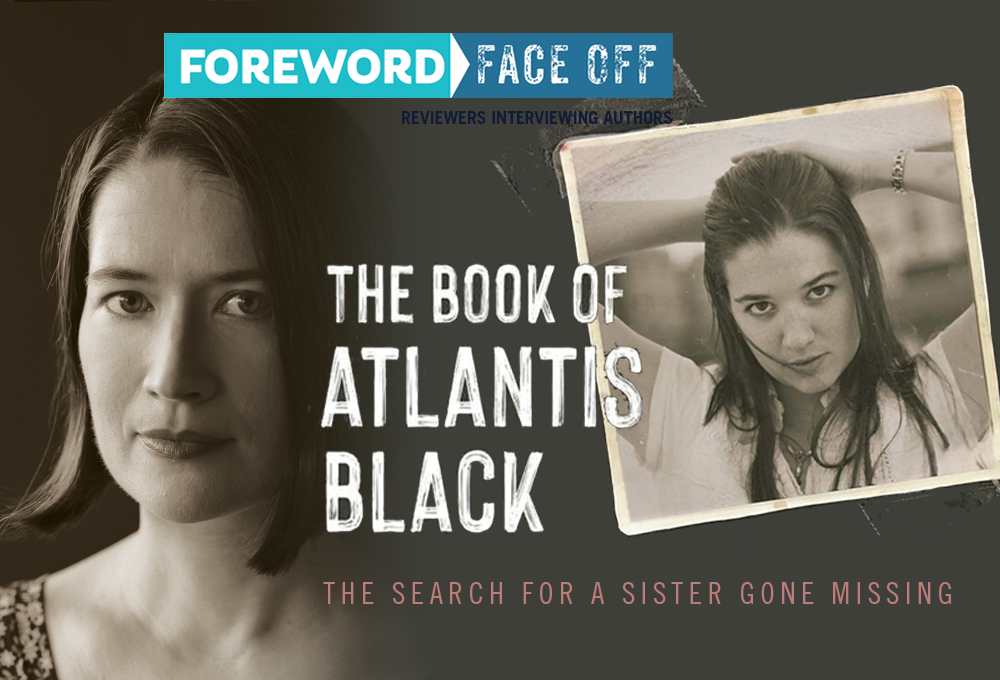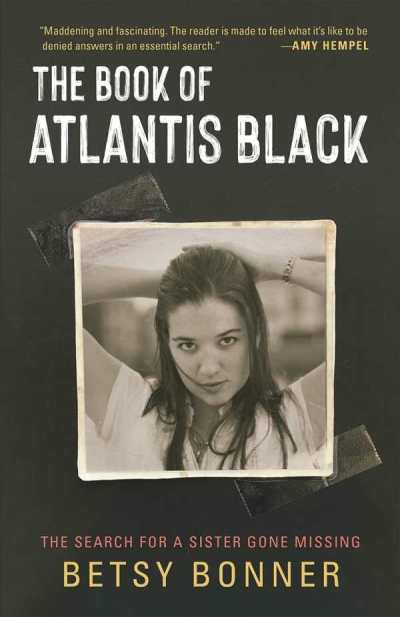Reviewer Michelle Anne Schingler Interviews Betsy Bonner, Author of The Book of Atlantis Black: The Search for a Sister Gone Missing

The story of Atlantis Black—whose death came too young via overdose in a Tijuana hotel room—is well known and an all-too-common experience for super talented artists. What many people don’t realize is that the circumstances of her death are suspicious because the autopsy photos don’t seem to match the body that Atlantis’ mother identified in the morgue. Might someone have forged the toxicology report? Could Atlantis have staged her own death to escape her troubled life of sex, drugs, and stardom?

These are just a few of the vexing questions Atlantis’s sister, Betsy, sets out to answer in The Book of Atlantis Black: The Search for a Sister Gone Missing—questions made all the more haunting after her mother commits suicide, leaving her alone to deal with the pain. This is not the stuff of a fairytale life.
Managing Editor Michelle Anne Schingler assigned herself to review The Book of Atlantis Black in Foreword’s July/August issue, and when she pitched the idea of an author-reviewer interview, we quickly reached out to Tin House Books to line it up.
Michelle, the stage is yours.
It’s clear throughout your book that you and your sister had a complicated relationship, but also that you loved her very much nonetheless. If you could speak directly to Atlantis: what unsaid thing would you wish to say?
What a sweet question. I’d tell her: Hey, guess what? Steve Lyon is mixing your second album. I’d tell her that because music was very important to her (until it wasn’t). “More than Opium” takes on several meanings in my memoir—it’s the name of a song my sister wrote, and it’s the title of her unfinished second album; and then, after she’s gone, it’s also the title of a creepy videotaped interview left among my sister’s things.
A month or so ago, my friend Tim Adams, who appears briefly in the book and who was my sister’s guitarist, reached Lyon, who produced Depeche Mode and the Cure. Lyon remembered Atlantis and the work they did together. Early in my book, Atlantis describes being devastated over the fact that they hadn’t finished that album. It’s clear that she had other things going on in her life, and that she just gave up. Now Lyon’s doing excellent mixes of her songs. “Carmen”—which Atlantis wrote after an imaginary song in Lolita—is a beauty.
It’s also clear that Atlantis often required a lot of your family’s attention, which further complicates the fact that your first book, which is in part a memoir, is so much about your sister. Was writing the book an additional expression of this complication? An act of catharsis? Something else?
It was both of those things. There were times in my family when Atlantis seemed to suck all the air out of the room. Everything had to be about her because she needed the most. I cared more about her than she did about me. It’s not that she didn’t care—I know that she loved me—but her life was consumed by her private dramas. Part of her was always hidden to me, and she wanted it that way. I was talking with Jeannie Vanasco about this at my book launch earlier this week at Madison Street Books in Chicago. It’s my book, but it’s also Atlantis’s: it wouldn’t exist without her, and she couldn’t have written it herself. Getting her album finished is also a bit like that: a cathartic act of sisterhood and of setting something right.
Are you more free to write for you now? If so, what are you working on?
Yes, I’m working on a novel, which I started writing after completing a draft of my memoir, before it sold. When Tin House bought it, I put the novel down and edited my memoir with Masie Cochran, who’s wonderful to work with and whose empathy I felt throughout that process. I used to write stories in high school, and writing a novel has always been a dream project. There are sisters in the book I’m working on—I think we’re never really free.
What do you want people—both Atlantis’s fans and those who know her most through your book—to know about your sister that they might not already?
It’s not in the book that a lot of Atlantis’s best music is coming out right now.
Have you received any reactions from those in Atlantis’s immediate circle to your book?
Yes! Leah Jackson, who was Atlantis’s partner for five years, wrote a beautiful tribute to Atlantis on her Instagram and other social media. Leah loved Atlantis, and has worked as a DJ, and she’s committed to getting my book read and Atlantis’s music heard. Leah and I had kept in occasional touch over the years, and as soon as we had an advance review copy, I asked Tin House to send it to her. A friend of Leah’s and Atlantis’s who now works in radio invited Leah to talk about Atlantis—one of their show’s themes is losing someone to addiction—and Leah wanted me to join her. So she and I plan to talk live together on Channel Q radio next week.
Most of Atlantis’s friends knew her in New York, where she lived for five years, and I’ve been hearing from so many of them. They miss Atlantis; they love the book. They all want to know more about what happened—who Gretchen is, for instance—and all have been deeply compassionate about the unresolved ending. Atlantis’s friends understand that when I notified them of her death, my family believed it was suicide, and that my investigative research suggested that her death might have been assisted; that she might even have been murdered; and that she’d certainly contemplated “disappearing” and faking her death—partly to avoid a court case, and certainly because she did everything to an extreme.
What do you imagine justice in Atlantis’s case (and your mother’s) might look like?
Justice, hmm. It would be interesting if Gretchen revealed herself and admitted whatever her role might have been in both my sister’s disappearance (and probable death), and in my mother’s death. And Atlantis’s lawyer did a terrible job of protecting his client; there might be a bit of justice in an admission from him of his failure.
Your book covers a lot of personal trauma, including, but also beyond, Atlantis’s and your mother’s death, that results in some feelings of raw intimacy with your audience. If the question is not too invasive: how are you doing?
I’m doing all right, given the pandemic. Excited about this week’s news of the Biden-Harris ticket.
Michelle Anne Schingler
